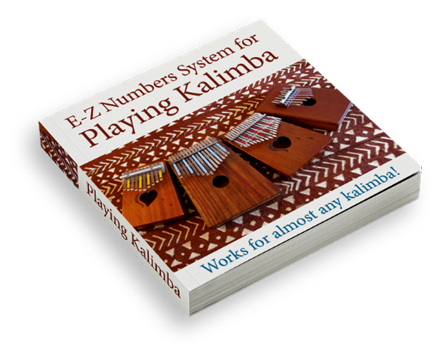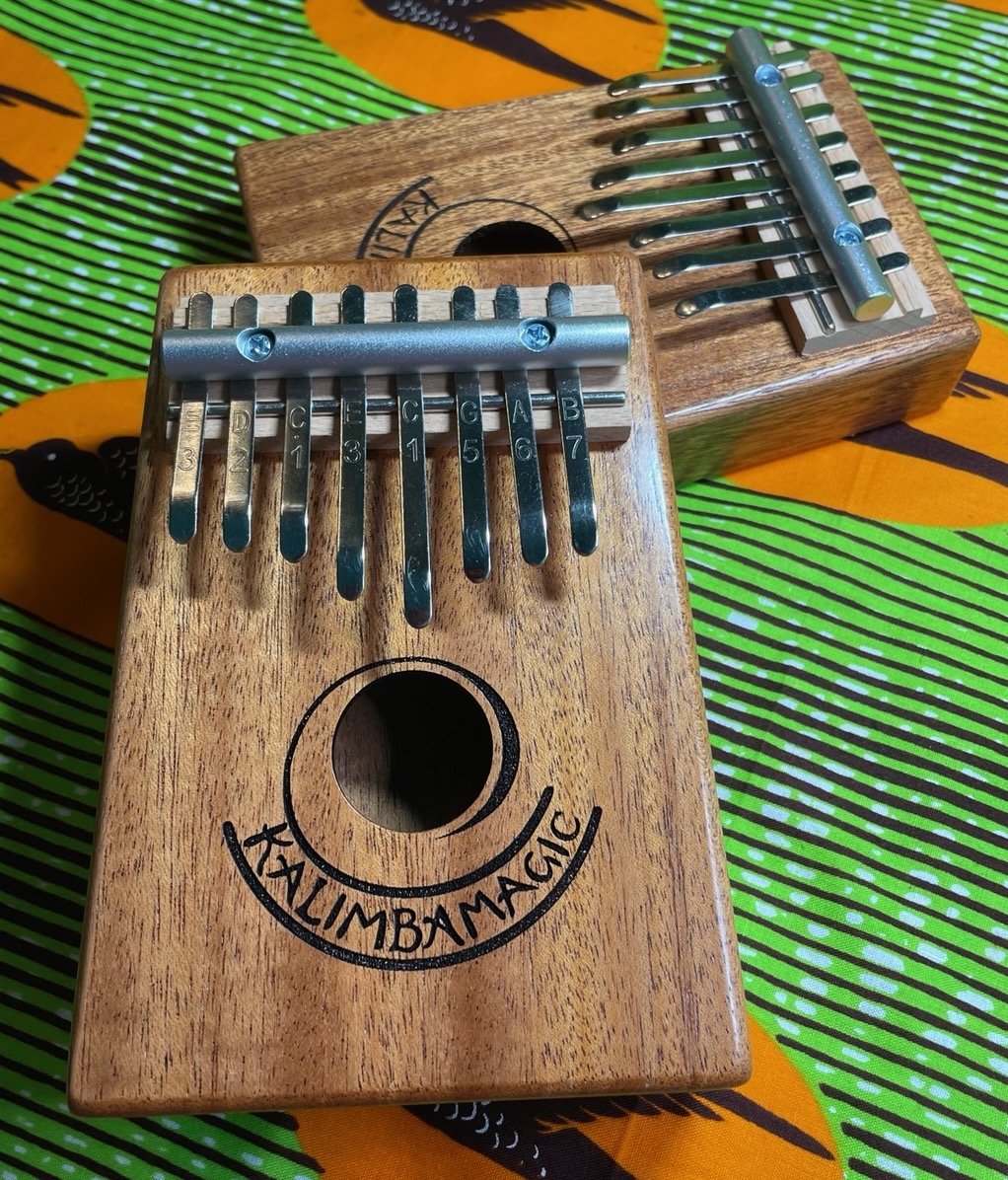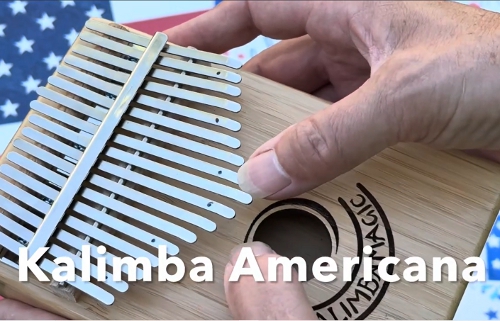Klara Wojtkowska writes about the spiritual mythology of one of her mbira heroes.
Chiwoniso Maraire was in love with her homeland, Zimbabwe, as only one who walks the narrow path between those who belong and those who are foreigners, can be. Born in Olympia, WA, young Chiwoniso and her siblings performed in the Maraire family ensemble. Her father, Dumisani Maraire, was a famous mbira player who trained at the Kwanangoma School. Her mother, as Chiwoniso described, was a marvelous singer. As a teenager she and her family moved back to Zimbabwe where Chiwoniso became involved in the local music scene.
Thomas Mapfumo exploded out of the cracked heart of vibrant Zimbabwean townships, and his voice – the lion of Zimbabwe – roared Chimurenga (the fight for land) music to the world. In contrast, Chiwoniso Maraire’s songs, though performed with a karimba, danced South African and American flavors, languages, tones, rhythms, and styles, with Zimbabwean ones. If you peel back all of those influences however, what you find is this: Born in the United States, blessed with a vivid song and a vivacious Zimbabwean soul, Chiwoniso Maraire took the old legends of her people back to the country of her Ancestors. She repaved the Zimbabwean mythological imagination, and revived Zimbabwean mythological lore.
Not only did Chiwoniso speak out against torture, pain, and general mistreatment of people, she first and foremost revived Shona mythology. She was enchanted by the stories of the old heroes – ancestors, spirits, mythological war. Chaminuka, Mbuya Nehanda, Sekuru Kaguvi – these were important spiritual and political leaders in Zimbabwean history – so much so that they lived on, not only in mythology, but they were well-known spirits who visited biras (Shona spiritual ceremonies where ancestral spirits communicate with the living) and possessed spirit mediums around the country. One of Nehanda’s biographies online describes her story beginning with “the original Nehanda…” from the fifteenth century, up through Mbuya Nehanda who led the first Chimurenga against colonizers in 1896. This Nehanda was eventually hanged, though according to legend the hanging was unsuccessful three times.
Chaminuka features often in Chiwoniso’s songs; Chaminuka was a spirit who powerfully possessed a famous spirit medium from Chitungwiza in the 1880’s. The man, a chief and what we would call a shaman, foretold the coming of colonialism. After being accused of killing a man’s wife, Chaminuka was summoned by King Lobengula into a death trap. Though he was warned previously, the old man went to meet his death with aplomb. He sat on a rock unharmed, calmly playing his mbira as bullets attacked him from all around. In time he told his attackers how to kill him, though he warned them that not eight years would pass before others would come to punish them for this deed.
To explain: The famous figures of Zimbabwe’s first Chimurenga – a struggle for land in 1896 – were all real historical individuals. However, because of their role as spirit mediums they were also said to have channeled the spirits whose names they adopted. They were not the first to have channeled those spirits, and so their histories extend over many lifetimes, lending themselves to the deep nuanced music of mythology.
One of Chiwoniso’s most famous songs, Ancient Voices, tells the story of the spirit of Chaminuka coming to an ordinary man, Pasipamire, and speaking through him. Pasipamire becomes a prophet and a leader, telling people that others will come from the West to take their land. In Chiwoniso’s song, “the people fought with courage in their hearts … and they sang songs of praise to the man who gave them truth – they would survive!”
The song celebrates both the political victory of independence as well as the spiritual victory of a battle fought in a good and righteous way. It also inspires people to redraw themselves into a story of honor and dignity rather than one of desperation and depravity.
Similarly, in her song Rebel Woman, Chiwoniso reminds us of the women who fought in the wars for independence and introduces historical women into a male-dominated narrative inspiring us to re-member the freedom of those who fought for freedom. Chiwoniso was a passionate feminist and often spoke up for women’s rights everywhere.
What was Chiwoniso’s relationship to politics? It was Chiwoniso who once commented in an interview that “to beat people, to threaten people, to put a person in a situation where they have to think for the next five hours about whether or not they are going to be okay is a very bad, bad thing to do…” She went on to explore the role of the artist in relation to political destruction: “I had a situation in the Book Café when riot police walked in… all these things come into your work as an artist and it puts you in a situation where you really have to think about what you are saying and what you are doing…” However, on other occasions Chiwoniso did not want to get into political discussions – she just wanted to sing and inspire people. How are we to understand her politics?
Separating politics and the arts only happens in a place where arts are optional entertainment and politics is a hardcore reality. In Zimbabwe, musicians, and other performing artists demonstrated that the freedom of a live, performing body offers enough spontaneity to truly be free and to demonstrate that freedom. And a truly free individual can comment on the political structures and impressions and experiences of the people. Chiwoniso sang her songs at a time when theatre artists were performing ‘hit-and-run-theatre’ in order to stage spontaneous plays meant to spread political messages and ideas regarding freedom in such a way as to evade both censors and the police.
Artists are turned towards the people. Politicians are turned towards themselves and each other. Artists sing for those who gather round them. Politicians create impressions for International Committees, the United Nations, other countries, and each other. Who really takes voting seriously these days, in any country? Politicians choke out the word freedom, and that word lands dull, heavy, and dead, weighed down by tons of spit and salt. Artists, in their naivety, take freedom literally. A warm body on-stage says what it will. The truth does not have to be scripted.
In this sense, Chiwoniso was political. To grow images and stories in people’s heads and hearts and bellies, to fill them with sound, to decorate the imaginations of people, their lives, and their communities is a political act. We have grown accustomed to a recognizable bristling at political artists – if they are political, then they focus on agendas, and their art becomes propaganda. Chiwoniso was different. Nothing she did was propaganda. It was a form of praise, a form of celebration, a form of worship – as well as a kind of balm to grief. This songbird of Zimbabwe harnessed feelings. Feelings harness imagination. Imagination is what inspires people to change themselves, their lives, and yes – inspires them to organize in support of political truth.
Artists know that if you lace any story with enough beauty, then people will hear, people will come. Politicians lace their messages with outrage or boredom to shut people’s ears to what they are truly doing. Chiwoniso did not need to be political or to make politics her central message – the resonance of her voice revealed deep truth and longing that inspired people to come, to heal, to rebuild, and to organize anew.
Chiwoniso Maraire didn’t just sing about Zimbabwean mythology. She sang to the spirits. She invited them – Mudzimu dzoka…kwaziwayi vakuru wee… kwaziwayi Changamire… (Ancestor come… we welcome you, Ancient Ones… We welcome you, the Big One.) She wooed them with beauty. The Spirits came and danced with her voice.
Kwaziwayi Chiwoniso Maraire. We welcome you, Zimbabwe’s most beautiful songbird and spirit medium.


Sign up for our newsletter and free resources with your email address:
We pinky promise not to spam you and to only send good stuff.
 Christmas in July 2025
Christmas in July 2025 Patriotic and American Music for Kalimba
Patriotic and American Music for Kalimba